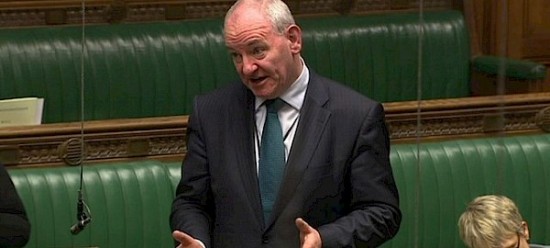SDLP Foyle MP Mark Durkan has expressed his deep concerns over last night’s vote in the House of Commons authorising airstrikes in Syria.
His concerns also centred on an “incoherent and incomplete” strategy by the British government could lead to ‘mission creep’ and a wider agenda of radicalisation in the Middle East.
“I did not dwell on any sense of resentment that the SDLP might have about the Prime Minister’s line about terrorist sympathisers, but I will say that I think it was unworthy and that it warranted an apology in the debate,” said the Foyle MP.
“However, this is not about any personal offence that we might feel; it is about the real fears and threats and the dire suffering faced by people in Syria and the concern that so many Hon. Members expressed for the safety and security of our constituents.
“People in Syria, as we know, are caught between the barrel bombs of Assad and the barbarism of Daesh, and they struggle to reach the barbed wire now going up in Europe.
“Yes, their plight demands a comprehensive strategy and compels a much stronger response from this government and others across Europe.
“The Prime Minister has told us that he is offering a comprehensive strategy. He told us he has listened to many of the considerations and concerns raised by Hon. Members, and in effect he has collated them and co-opted them in the rolling references in the motion, which was presented as a comprehensive strategy.
“I do not believe that it is coherent or complete. I do not believe that it is convincing in the collateral considerations and claims that are or are not addressed.
“I do not believe that it is cohesive in how its different dimensions meet and join.
“There is a severe risk of feeding what we are trying to fight – of feeding a wider agenda of radicalisation – by agreeing to airstrikes and so adopting the role that the jihadism playbook craves us to adopt.
“We were told that we should agree to airstrikes in Syria because they are merely an extension of what is already happening.
“The people who tell us that are the same people who tell us that there is no danger of mission creep in what the government propose, yet there has already been an absolute mission flip.
“Only two years ago the idea was to go in and airstrike against Assad, and now it is to go in and airstrike against the very people we would have been assisting had we conducted airstrikes two years ago.
“It has also been argued that we have to take such action to stand by our allies. Does that mean that this House would have to agree to the next thing our allies do? What about ground troops, for instance?
“Many Hon. Members who support airstrikes have been very clear that they would not agree to the deployment of ground forces.
“Indeed, we are told that one of the merits of the motion is that it contains no commitment to ground forces. What if people say that that is what is required?
“What if the operational circumstances and exigencies of the conflict are such that ground forces are required, because the 70,000 Free Syrian Army people are not there?
“They cannot be provided by CGI. What if everybody agrees that ground forces are needed to achieve what the government want in Raqqa?
“What happens when Assad decides that he is moving into Raqqa, supported by Russia?
“We will then have a conflict within the alliance itself, because what the government propose is on the basis of a shifting alliance with some very shifty allies, including some who have been the syndicators of terrorism, powers and personages within the Gulf states.
“Members should question what Turkey has been doing in relation to oil and arms and Daesh; question what Saudi Arabia has been doing, and they are our allies.
“When the government’s mission changes, where will we go? We will have mission creep.”






